Performing Arts
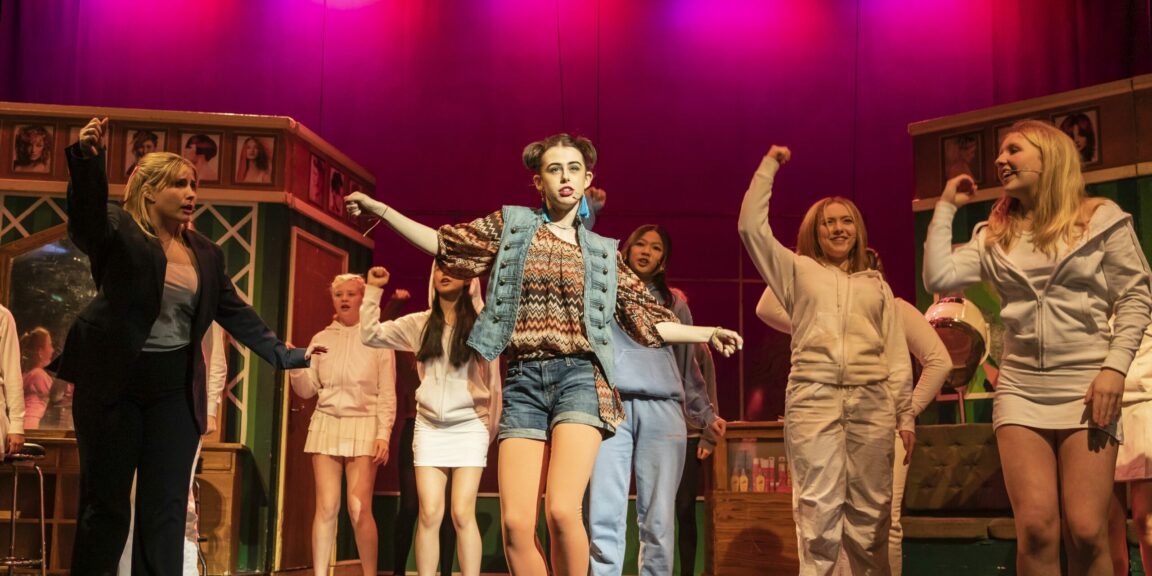
The Performing Arts help develop each pupil intellectually, socially and pastorally.
The performing arts help to develop each pupil intellectually, socially and pastorally. The performing arts engage with the entire school curriculum. Drama, Music and Dance’s public aspects – performing and sharing work with others – provide important links between the pupils, parents and the wider community. Above all, the performing arts at Tormead strive to be enjoyable, accessible and actively involve pupils in different ways and at all levels. The performing arts have a vital part to play within Tormead’s academic curriculum, providing a unique outlet for self-expression, creativity, teamwork and fun.
Our ethos at Tormead is to enable our pupils to feel comfortable and confident when performing to an audience, whatever their performance level.
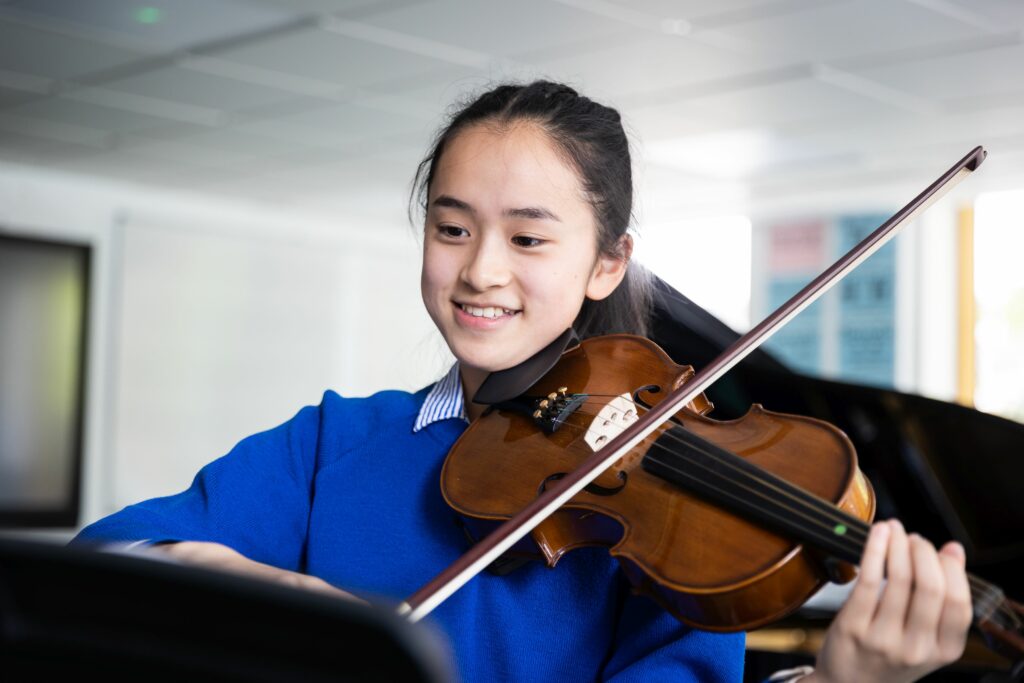
Music
Music is central to school life at Tormead. Pupils make music at over 60 events each academic year, with additional opportunities for informal performances.
Tormead has a 20-strong team of Music teachers and instrumental specialists. Nearly 50% of pupils learn an instrument in school and a range of co-curricular ensembles enhances the music curriculum.
Wider Opportunities
Music has taken Tormead pupils all over the UK and beyond. We hold a biennial music tour to Europe, with previous tours to Germany, Italy and France. Closer to home, pupils have recently performed concerts, recitals and choral services at a number of venues including Winchester, Southwark and Portsmouth Cathedrals, G-Live and the Yvonne Arnaud Theatre.
Many of Tormead’s outstanding musicians pursue music at a high level outside school as members of groups including National Youth Harp Orchestra, Surrey Youth Choir, Guildford County Wind Band, Guildford Cathedral Choir, and South West Surrey Concert Band.
Music scholars and exhibition holders follow a programme of enrichment and extension including workshops, masterclasses and concert visits.
Tormead runs an endangered instruments scheme, offering ten fully-funded places to learn an endangered instrument each academic year. This year places have been offered on bassoon, double bass, french horn, oboe, orchestral percussion, trombone and viola.
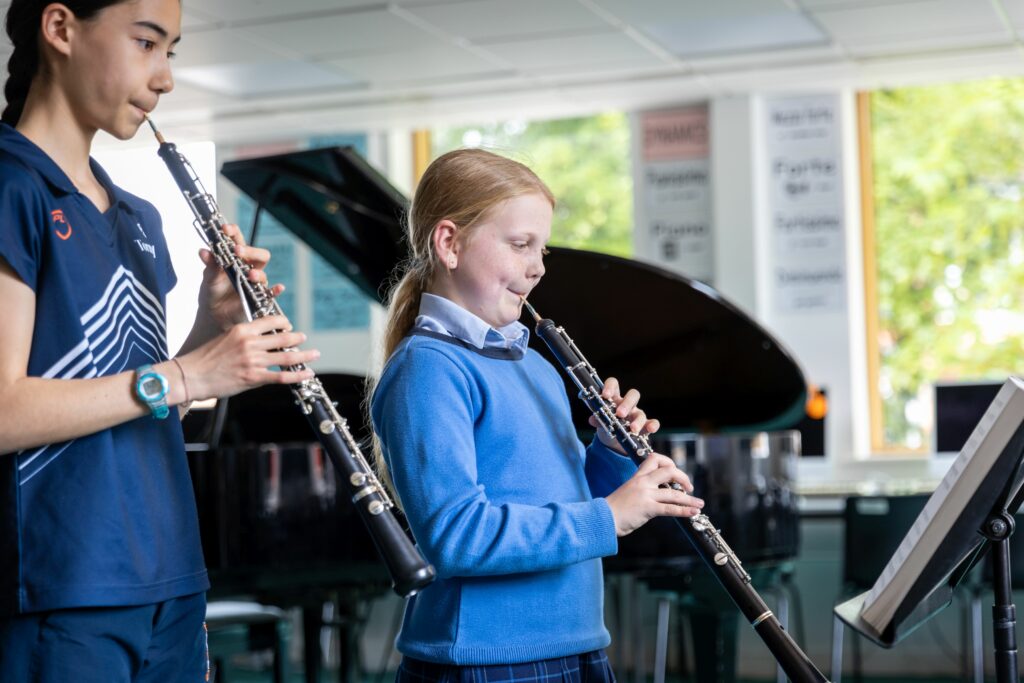
- Music Curriculum
Lower School
Music is taught to all pupils in Years 7 and 8 and is chosen as an option in Year 9. Pupils receive one 55 minute lesson each week in which they learn to critically appraise music, perform on a variety of instruments including keyboards and percussion and compose. The department is equipped with a suite of Macs running GarageBand, Logic and Sibelius software.
Projects include djembe drumming, Indian Fusion, Samba, Fanfares, Blues, Pop Songs and Musical Theatre. Each year group attends either a music workshop or a visit linked to the curriculum.
GCSE
We follow the Edexcel GCSE music syllabus which focuses on the three core elements of appraising, composing and performing:
Appraising (40%) – Pupils study eight set works from four Areas of Study – vocal music, music for stage and screen, instrumental music and fusions. Set works are diverse, covering Bach to Queen and Schwartz’s Defying Gravity to Star Wars. This component is assessed by a listening exam at the end of Year 11.
Composing (30%) – Pupils compose two pieces during the course – a free composition of their choice, and a brief composition which fulfils a brief released at the start of year 11.
Performing (30%) – Pupils perform two pieces which are recorded in Year 11. One is a solo performance and the second is an ensemble performance.
- Co-Curricular Music
Co-curricular music thrives at Tormead with larger bands and orchestras and smaller ensembles accommodating musicians of all abilities. Over 20 ensembles rehearse every week with large-scale performances featuring pupils in their hundreds to music festivals and more intimate soloist evenings.
Our co-curricular ensembles include:
Choirs
- Schola Cantorum
- Chamber Choir
- Sound Intentions
- Tormead Vox
- Tormead Young Voices
Instrumental
- Concert Band
- Symphony Orchestra
- Jazz Band
- Senior and Intermediate String ensembles
- Brass Ensemble
- Clarinet Choir
- Senior and Intermediate Percussion ensembles
- Chamber ensembles including saxophone quartet, Clarinet Choir, Mozart Players, The Rosen Band and Scholar’s ensembles
Appraisal
- Theory Club
- GCSE and A Level composition
- GCSE Dictation
- ABRSM Aural
Individual instrumental lessons
Nearly 50% of Tormead pupils learn an instrument in school. Our visiting music teachers offer pupils lessons on a wide range of instruments with lessons available from beginner level to diploma and beyond. Tormead has a limited number of school instruments for loan.
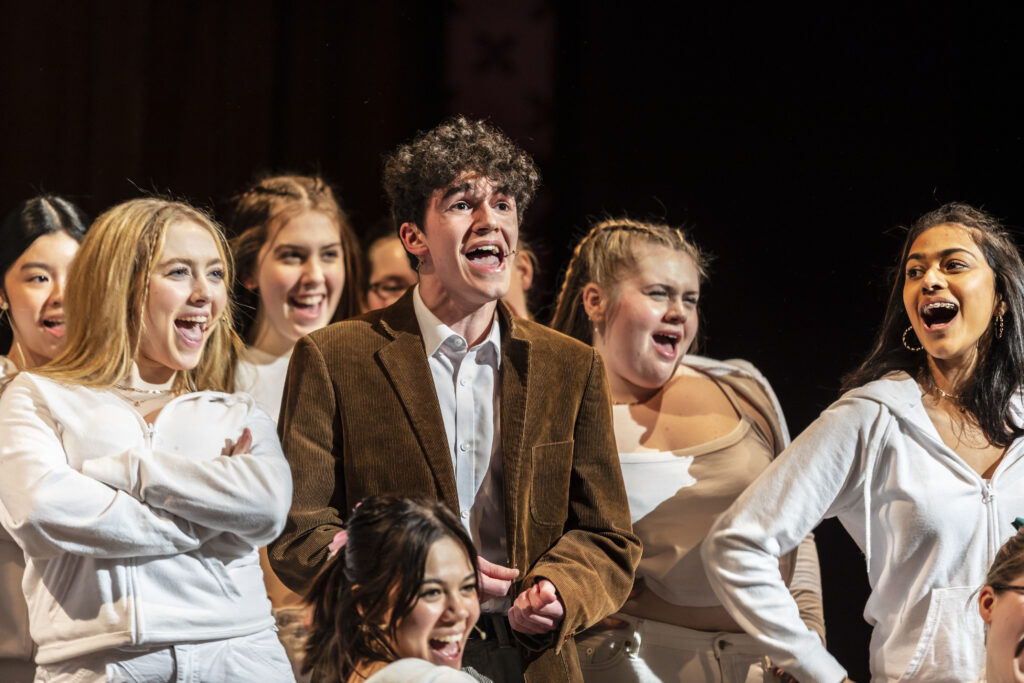
Drama
The aims of Tormead Drama are threefold: enjoyment, innovation and self-expression. It has a unique place in the school curriculum. We aim to give every Drama students skills that are transferable and useful in the wider world, such as co-operation, self-control and, most importantly, self-confidence, through a wide and varied curricular and extra-curricular programme.
A recent Russell Group survey asked the HR departments of all the FTSE 250 companies what were the most important qualities they looked for in an employee. The two most common answers were teamwork and communication – both skills which are implicit in drama lessons. We promote a job in the Arts as a possibility to be considered and therefore encourage professionals in to teach workshops whenever possible. We make our girls aware of external events and opportunities, as well as offering a varied plethora of internal activities for them to be involved in, both on stage and behind-the-scenes.
—Poppy, Tormead Drama student‘Being involved in Tormead Drama activities has been a hugely rewarding experience, encouraging me to experiment and explore new concepts from the past, present and future in a highly creative and fun environment.’
- The schemes of work devised for Years 7, 8 and 9 have the following objectives:
- To develop the girls’ natural performance skills by introducing them to a wide range of theatrical techniques and acting styles.
- To encourage a committed, thoughtful and disciplined attitude to Drama.
- To offer the girls lesson content of a standard appropriate to an academic school such as Tormead, so that pupils are stretched intellectually as well as in the development of their performance skills.
- To encourage enjoyment of the subject in a creative, but non-pressured, environment. No homework or written work is set for Drama at Key Stage 3. Girls are free to experiment and make mistakes. Assessment is done during lessons, both by the teacher & students, as part of their evaluation of their work.
- To develop a passion for Drama through watching, reading and participating in plays, theatrical events and performances.
- All lessons are designed to cover the 5 key skills of confidence-boosting, communication, self-control, co-operation and evaluation and if a girl become an expert in all 5 areas then they are likely to be an extremely talented performer too.
The Drama curriculum
- Year 7
In Year 7, the main aim is to teach the pupils to develop co-operation, trust and communication skills; to build confidence and self-control; the beginnings of characterisation and the basics of stagecraft. This is achieved by structured exercises in improvisation and script work. These skills are then extended into more complicated and challenging work as the year progresses. They will also discover more about how drama can be used as a means of exploring issues.
- Year 8
In Year 8, the pupils learn more about stagecraft and the importance of the audience; movement and voice; focus; maintaining a role; characterisation and spatial awareness. They study specific techniques such as mask-work and commedia dell’arte. In the course of this study, they are introduced to more challenging improvisations and more sophisticated scripts as well as developing a good grasp of drama vocabulary.
- Year 9
In Year 9, the aim is to consolidate basic presentation techniques whilst keeping the focus on the co-operation skills of individuals working in a group. There will continue to be structured exercises in both improvisation and script work designed to test their imagination and this will help prepare students for the GCSE should they opt for it, as well as develop skills for life. They will end this Key Stage with a devising project that will give them the artistic freedom to present drama in a style of their own choosing.
- GCSE
Drama at GCSE is a subject that is both active and creative. Lessons consist of practical work, discussion and reflective writing and students will be able to work in more depth than they have been able to previously. We follow the Eduqas syllabus, which places a strong emphasis on practical devising work – there is definitely less written work than most other subjects as the examination board encourages the ability to write succinctly. Students will learn about all aspects of theatrecraft: acting, design and directing. We explore various practitioners such as Stanislavski, Frantic Assembly, The Paper Birds, Brecht and Boal as well as specific genres such as Physical Theatre and Theatre-in-Education. Candidates can also gain an understanding of how to use make-up, costume, set design, lighting and sound effectively and have the option to choose one of these design areas for assessment instead of performance.
We have many different types of student opt for Drama and it is rated highly by all universities as it helps make you confident, sensitive and a strong leader. Whether you are a naturally outgoing person or a quiet, thoughtful person you can succeed in this subject as long as you bring enthusiasm, imagination, focus and a willingness to work creatively.
In a nutshell, GCSE Drama is serious fun.
How is the course examined?
Component 1 (40%) is a devised unit in which you will create an exciting piece of new theatre in small groups, based on a practitioner or style of theatre you have studied. There is a written report about the process (which has a maximum word count of just 900 words) plus an evaluation of the performance which is written in controlled conditions.
Component 2 (20%) involves the performance of a script to an examiner in small groups/pairs. There is no written work for this component.
Component 3 (40%) is a written examination consisting of a series of questions based on an interesting set text we will have studied practically, plus one short question analysing a theatre production you will have seen. The examination lasts 1 hour and 30 minutes.
Extra-curricular Drama
We operate an inclusive ethos and stage at least two productions per year, involving girls from every year group within the Senior School. The style of each production varies to ensure we show a range of comedies, tragedies, modern and classics. Every other year, the school stages a musical. Recent productions have included Legally Blonde: The Musical, Little Women, Bright Young Things and The Tempest. Girls are encouraged not only to act but also to help in other areas of theatrical production, such as stage management, costume, make-up, lighting and sound. Theatre Technical Club runs once a week to cater for these students and is regularly led by the 6th Form Technical Theatre Mentors. There is also a weekly Drama Club and a Glee Musical Theatre Club and the work undertaken here often leads to public performances in the form of assemblies, small scale productions or as part of the annual Drama, Music and Art Evening. A week-long Drama School, run by the Head of Department, takes place at the end of the summer term which is open to Tormead girls and RGS boys from Year 9. We also hold an annual House Drama competition where entries are written/devised, auditioned, cast and directed by the Sixth Form House Captains, with a cast selected from girls in Year 8 and 9 under the supervision of a member of staff. Pupils in Year 10 and 11 are encouraged to direct and assist where possible.
Theatre visits and workshops
There are theatre trips organised annually as part of the GCSE requires pupils to experience live theatre performances as part of the course. Highlights have included trips to see ‘The Woman in Black’, Frantic Assembly’s ‘The Unreturning’, Florian Zeller’s ‘The Son’, Kneehigh’s ‘Flying Lovers of Vitebsk’ and Little Bulb’s production of ‘Orpheus’. The older pupils also take part in at least one bespoke workshop by an outside practitioner each year. Most recently, we have welcomed Splendid Productions, The Paper Birds and Frantic Assembly to Tormead. We also have good links with the wider community such as the Drama Departments at Guildford School of Acting and at the Royal Grammar School in Guildford and we often undertake joint ventures, such as workshops and productions with their students and staff.
LAMDA speech and drama
Speech & Drama is a very popular extra-curricular subject at Tormead. Two highly-experienced and qualified teachers work with small groups of students in a dedicated examination space to develop their communication and performance skills.
Students are encouraged to work creatively and sympathetically with each other to acquire knowledge, develop technical skills and have fun in a relaxed, positive atmosphere. The ability to express themselves articulately, whilst remaining relaxed and confident, is an invaluable life skill.
LAMDA examinations are held at Tormead twice a year and Grades 6, 7 and 8 earn UCAS tariff points.
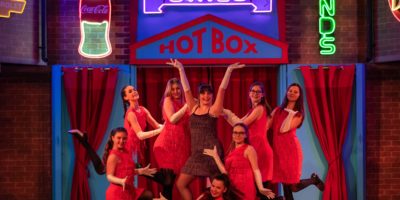
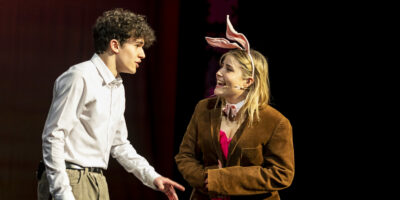
Discover more opportunities for the Performing Arts within our Extra-curricular provision.


